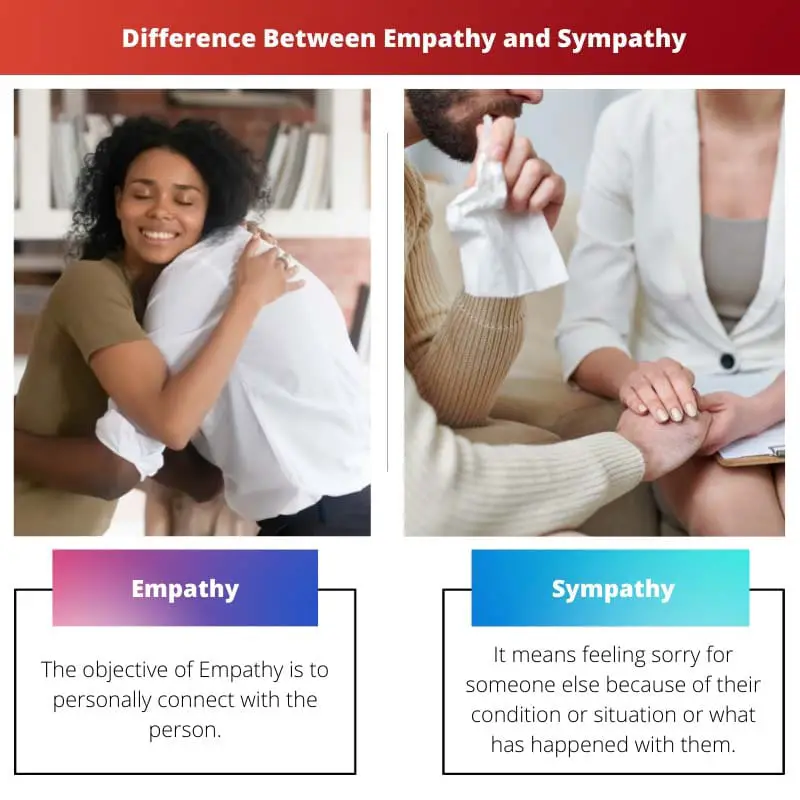Empathy involves understanding and sharing the feelings of others, while sympathy is the acknowledgment and compassion for someone’s suffering without necessarily experiencing it personally.
Key Takeaways
- Empathy is the ability to understand and share another person’s feelings, while sympathy is the feeling of compassion or concern for another person’s well-being.
- Empathy involves putting oneself in another person’s shoes and experiencing their emotions, while sympathy involves acknowledging another person’s feelings without necessarily experiencing them.
- Empathy is more emotionally intense than sympathy and requires more emotional intelligence.
Empathy vs Sympathy
Empathy is the ability to understand and share the feelings of others, involves putting oneself in another’s shoes and experiencing their emotions. Sympathy is feeling sorry for someone or showing compassion and does not necessarily require understanding the other person’s feelings.

Empathy makes the person feel alongside and connect with another, but Sympathy makes the person feel pity for another as they evaluate what others might be feeling.
Comparison Table
| Feature | Empathy | Sympathy |
|---|---|---|
| Definition | Understanding and sharing the feelings of another person. | Feeling or expressing sorrow or compassion for someone’s misfortune. |
| Perspective | Ability to see things from the other person’s point of view. | Feeling sorry for someone else’s plight without necessarily understanding their perspective. |
| Emotionally involved | Yes, emotionally connects with the other person’s experience. | No, primarily focused on one’s own emotions in response to the other person’s situation. |
| Action-oriented | Motivates action to help or support the other person. | May not always lead to action, but offers emotional comfort. |
| Benefits for others | Provides deeper understanding and support, leading to more effective help. | Offers emotional validation and comfort, but may not address the root cause of the problem. |
| Benefits for self | Increases emotional intelligence and social connection. | Can boost self-esteem and moral standing. |
| Real-world examples | A friend confides in you about losing their job. You listen actively, try to understand their feelings, and offer practical support. | Seeing someone crying on the street, you feel sorry for them and offer a few words of comfort or even donate money. |
What is Empathy?
Empathy is a multifaceted psychological phenomenon encompassing the ability to understand and share the feelings, thoughts, and perspectives of others. It goes beyond mere sympathy or compassion, involving a deeper emotional connection and cognitive understanding of another person’s experiences.
Components of Empathy
- Cognitive Empathy:
- This aspect involves the intellectual understanding of someone else’s emotions or perspective. It requires recognizing and comprehending another person’s feelings without necessarily sharing those emotions.
- Emotional Empathy:
- Emotional empathy involves sharing in the emotional experiences of others. It goes beyond understanding intellectually and involves feeling similar emotions in response to another person’s situation.
- Compassionate Empathy:
- Also known as empathic concern, compassionate empathy combines cognitive and emotional empathy with a desire to alleviate the suffering or difficulties faced by others. It leads to a motivation to take positive actions to help or support.
Importance of Empathy
- Enhanced Communication:
- Empathy facilitates effective communication by fostering a deep understanding of others’ perspectives. It helps individuals navigate diverse social situations with sensitivity and receptiveness.
- Building Relationships:
- The ability to empathize is fundamental to building and maintaining meaningful relationships. It creates connection and trust, as people feel understood and valued.
- Conflict Resolution:
- Empathy is instrumental in resolving conflicts by allowing individuals to see issues from multiple perspectives. It promotes a collaborative approach to finding solutions that address the needs and concerns of all parties involved.
- Leadership and Teamwork:
- Effective leaders demonstrate empathy and understanding of the needs and motivations of team members. Empathy promotes a positive team dynamic in a collaborative environment, fostering cooperation and shared goals.
- Promoting Altruism:
- Empathy is a key driver of altruistic behavior. When individuals can emotionally connect with the struggles of others, they are more likely to engage in acts of kindness, generosity, and support.
Developing Empathy
- Active Listening:
- Being fully present and attentive when others speak allows a deeper understanding of their thoughts and emotions.
- Perspective-Taking:
- Actively imagining oneself in another person’s shoes helps to broaden one’s perspective and enhance cognitive empathy.
- Cultivating Curiosity:
- Asking questions and expressing genuine interest in others’ experiences fosters empathy by encouraging a deeper exploration of their thoughts and emotions.
- Practicing Open-Mindedness:
- Approaching situations with an open mind and suspending judgment allows a more empathetic response to diverse perspectives and experiences.

What is Sympathy?
Sympathy is a fundamental aspect of human emotion and connection, representing a genuine understanding and shared feelings for another person’s experiences, challenges, or suffering. Unlike empathy, which involves putting oneself in another’s shoes and sharing one’s emotional experience, sympathy entails a heartfelt acknowledgment of someone else’s situation without necessarily sharing one’s emotional state.
Key Characteristics of Sympathy
Understanding and Recognition: At the core of sympathy is the ability to comprehend and recognize the emotions and struggles of others. This involves genuinely understanding the perspectives, challenges, or hardships someone faces, fostering a sense of connection and compassion.
Emotional Response: Sympathy elicits an emotional response from an individual. It can lead to feelings of concern, care, or sorrow as a natural reaction to recognizing another person’s difficulties. This emotional response underscores the human capacity for compassion and the desire to alleviate the suffering of others.
Expressing Support: One crucial aspect of sympathy is expressing support or comfort to those experiencing hardship. This may take various forms, including offering kind words, assistance, or being present for someone in need. The expression of sympathy reinforces social bonds and contributes to the giver’s and receiver’s emotional well-being.
Distinctions from Empathy and Compassion
Empathy: While empathy involves sharing another person’s emotional experience, sympathy is more about understanding and acknowledging those emotions without necessarily feeling them firsthand. Empathy involves a deeper emotional connection, whereas sympathy focuses on expressing care and support.
Compassion: Sympathy and compassion are closely related but differ in their scope. Compassion goes beyond understanding and recognition to actively wanting to alleviate the suffering of others. It involves a genuine desire to help and make a positive impact, leading to actions that contribute to the well-being of those in distress.
Cultural and Social Significance
Sympathy plays a crucial role in interpersonal relationships and societal cohesion. It fosters a sense of shared humanity, promoting kindness, cooperation, and a willingness to help others. In various cultural and ethical frameworks, the value placed on sympathy underscores its significance in creating supportive communities and fostering a more compassionate world.

Main Differences Between Empathy and Sympathy
- Definition:
- Empathy: The ability to understand and share the feelings of another.
- Sympathy: Feeling compassion, sorrow, or pity for the hardships, struggles, or misfortunes of others.
- Perspective:
- Empathy involves stepping into someone else’s shoes and experiencing their emotions from their point of view.
- Sympathy involves acknowledging and showing concern for someone’s emotions without necessarily experiencing them oneself.
- Connection:
- Empathy creates a deeper connection as it requires understanding and resonating with the other person’s emotions.
- Sympathy creates a sense of care and concern but may not necessarily involve understanding the emotions on a deeper level.
- Response:
- Empathy leads to a more supportive and understanding response, as it involves truly grasping the other person’s feelings.
- Sympathy might lead to expressions of kindness, comfort, or support, but it may not necessarily involve fully comprehending the other person’s emotions.
- Involvement:
- Empathy involves an active engagement with the other person’s emotions, leading to a desire to help or support them in a meaningful way.
- Sympathy involves acknowledging the other person’s emotions and offering support or comfort but may not necessarily involve taking action to address the underlying issues.
- Outcome:
- Empathy fosters deeper connections, understanding, and trust in relationships.
- Sympathy can offer comfort and support but may not always result in the same level of understanding or connection as empathy.

- https://www.amhcajournal.org/doi/pdf/10.17744/mehc.32.2.228n116thw397504
- https://psycnet.apa.org/record/2003-02621-019

The section on the importance of empathy in promoting altruism and fostering collaborative environments resonates deeply. It underlines the transformative impact of empathy on our communities and workplaces.
The strategies for developing empathy through active listening, perspective-taking, curiosity, and open-mindedness are vital for cultivating a more empathetic and understanding society.
Absolutely, the article effectively emphasizes empathy’s role in leadership and conflict resolution, shedding light on its relevance in professional settings.
I appreciate the practical real-world examples provided to illustrate the differences between empathy and sympathy. It helps to clarify these concepts in a relatable manner.
The comparison table between empathy and sympathy effectively summarizes their distinctions, providing a clear and concise overview of each concept.
Agreed, the practical strategies for developing empathy through active listening, perspective-taking, curiosity, and open-mindedness are valuable tools for personal growth and interpersonal understanding.
I found the section on developing empathy particularly insightful, offering actionable steps for individuals to enhance their empathetic abilities in everyday interactions.
This article provides a comprehensive understanding of the differences between empathy and sympathy. It’s crucial to recognize these distinctions in order to cultivate deeper emotional connections with others.
Absolutely, the article’s breakdown of empathy’s cognitive, emotional, and compassionate components is insightful and offers valuable information for improving social interactions.
The distinction between cognitive, emotional, and compassionate empathy provides a nuanced understanding of empathy’s multifaceted nature. It’s essential to recognize the complexity of empathy in our interactions with others.
Absolutely, the article effectively conveys the significance of empathy in enhancing communication, building relationships, and promoting altruism. It offers valuable insights into the benefits of empathetic behavior.
The article’s emphasis on empathy’s role in promoting prosocial behavior and contributing to interpersonal relationships is highly informative. It highlights the significance of empathy in our social interactions.
Indeed, the importance of empathy in conflict resolution and leadership demonstrates its value in various aspects of life, both personal and professional.
The article’s exploration of the components and importance of empathy is thought-provoking, emphasizing its role in enhancing communication, developing relationships, and promoting altruism.
The multifaceted nature of empathy, as detailed in the article, highlights its profound impact on human interactions and social dynamics. It’s an insightful examination of empathetic behaviors.
The practical strategies for developing empathy, such as active listening and perspective-taking, offer valuable insights for individuals seeking to cultivate empathetic responses in diverse contexts.
The article provides a comprehensive understanding of empathy and sympathy, shedding light on their subtle yet significant differences. It’s an enriching read for anyone seeking to deepen their interpersonal connections.
The comparison table effectively delineates the features of empathy and sympathy, providing a clear overview of their distinctions. It’s a resourceful guide for understanding and practicing empathetic behavior.
Absolutely, the article’s focus on developing empathy through active listening, perspective-taking, curiosity, and open-mindedness offers actionable steps for individuals to enhance their empathetic abilities in everyday interactions.
The article’s in-depth exploration of empathy and sympathy offers a comprehensive understanding of their distinctions and contributions to human connection. It’s a thought-provoking piece on emotional intelligence.